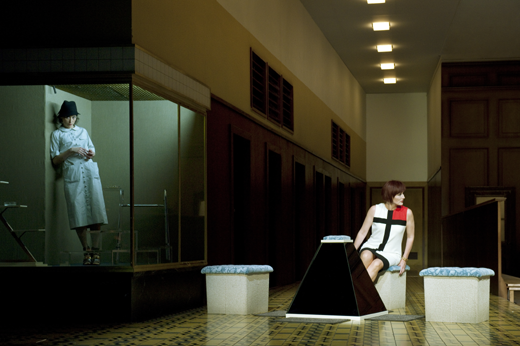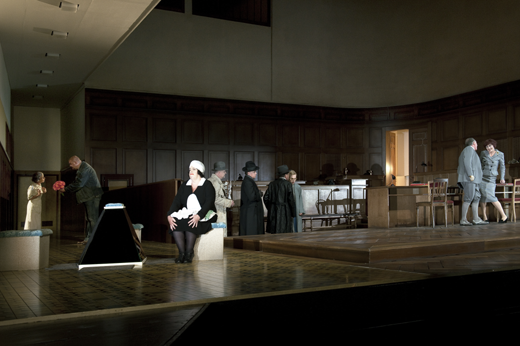 Austria L.Janáček, Věc Makropulous: Soloists, Esa-Pekka Salonen (conductor), Vienna Philharmonic, Concert Association of the Vienna State Opera Chorus, Grosses Festspielhaus, Salzburg, 18.8.2011 (JFL)
Austria L.Janáček, Věc Makropulous: Soloists, Esa-Pekka Salonen (conductor), Vienna Philharmonic, Concert Association of the Vienna State Opera Chorus, Grosses Festspielhaus, Salzburg, 18.8.2011 (JFL)
Production Salzburg Festival
Direction: Christoph Marthaler
Sets & Costumes: Anna Viebrock
Light: Olaf Winter
Chorus: Jörn Andresen
Cast
Emilia Marty: Angela Denoke
Albert Gregor: Raymend Very
Vítek: Peter Hoare
Krista: Jurgita Adamonytė
Jaroslav Prus: Johan Reuter
Janek Prus: Aleš Briscein
Dr.Kolenatý: Jochen Schmeckenbecher
et al.

Věc Makropulos, Fantabulous
The Vienna Philharmonic doesn’t always get the glory and it doesn’t always deliver the best performances, but it really is the orchestral workhorse of the Salzburg Festival. And this year it certainly deserves all the praise it gets and then some for the work they are doing, in several shifts, in the pit. Phenomenal their malleability from conductor to conductor (Muti, Thielemann, Salonen, Nézet-Séguin), astonishing the average quality of the playing, delightful the various and very different nuances they bring to Verdi, Strauss, Janáček, and Mozart.
Věc Makropulous (The Makropulous Case) has terrific music with sweep and drama and sometimes ferocious energy, sometimes sardonic wit, and then chilling severity. It is based on a dark comedy by Karel Čapek about the ongoing, century-long court case of an inheritance dispute into which the famous diva Emilia Marty interjects herself—seemingly for reasons of fairness at first, having surprising knowledge of case details going back a hundred years and more.
I thought I had even perceived aspects of Salome in the music and Angela Denoke’s portrayal of Emilia Marty but in a brief and uncomfortable interview some days later, Denoke suggested that was nonsense of the first order, as the characters have nothing whatsoever in common. (They do have something in common, actually, and that is Denoke who was not only outstanding in every way in Makropolus but also the most notable Salome I have seen in the last few years. Perhaps I was thus misled.)Emilia Marty, it is slowly revealed, is the great grandmother of one of the contestants, and the lover of the great-great grandfather of the other… then still living under the pseudonym Ellian Macgregor. She couldn’t care less who of the two receives the legacy of Josef Ferdinand Prus, but she does care about getting her hands on the recipe for the formula of eternal youth that has afforded her 337 years so far. Unfortunately a life not being finite means a life without intensity, without perceptible arch; Emilia ex-Ellian ex-Elina Makropulos (her actual, original name) has become a cynical and cold creature that suffers from her longevity more than she enjoys it. Thanks to Janáček, who superimposes his ever-lasting unsuccessful love-affair with Kamila Stösslová into this, and every other opera, she has spurts of humanity, breaking out like passionate rashes. Janáček bestows her with magnificent music… furthered in this case by Esa-Pekka Salonen’s markedly vital, fiery-yet-objective reading. Navigating the organ-like blocks, Salonen created an arch through the music that sucked one in from the first sweeping minutes to the harshly cackling, then Puccini-esque lyrical, finally brass-question-mark dotted finale.
If Denoke stood out, she did so from a very even and satisfying cast with Johan Rueter as Jaroslav Prus really coming to life in the last act once he hears of the suicide of his son, Janek Prus (Aleš Briscein). Raymend Very as Albert Gregor, Peter Hoare as Vítek, and Jurgita Adamonytė as the aspiring singer and proto-Bobby soxer Krista. In conversation Angela Denoke complained that singers get very little credit for the productions they help to create, the focus instead going exclusively to the director. Christoph Marthaler, in this case. The irony is that in a successful production, the memory of the singers increasingly turns into a dramatic memory; each singer part of a whole and inextricably connected to a greater impression. The great stillness and tension with which Denoke’s Emilia endures the world around her (“very difficult at first, because I am a very physical singer and prefer to move around”) thus became part of a greater impression of ‘flavor’. That flavor, found in abundance, was the work of Anna Viebrock, responsible for the superb stage set—a 1920s central European court room that might have been straight out of a Kafka play—and the period costumes.
To the left and the right of the wide stage of the Grosses Festspielhauswere—literally—side-shows going on. An entertaining prologue (mouthed and super-titled by two re-occurring, chain-smoking extras, one young, tall, and beautiful, the other old, wry, and diminutive) set up the question of mortality, how long people ought to live, who would be allowed to live longer, who would decide on that, and whether Emilia Marty is indeed the greatest opera singer. The theme of (near-) eternal recurrence is played out not only on stage—insinuated in the long life of Elina Makropulos—but in this side-show. Whether a burly warden carries the old lady off stage only to find her re-appearing at the door he just walked her from, or whether he brings one bouquet of flowers after another to her (a ceremony that lasted for nearly half an hour), these bits take the pressure off the main events… almost as if Marthaler didn’t quite trust the story itself to be sufficient to hold one’s interest. The same principle ruled the third act when during the orchestral music the court assembles and disassembles (largely through trap doors) thrice or four times… giving a physical touch to the trial that already lasts for 100 years. Every character, except the stiffly rigorous Emilia, has a tick or develops one over the course of the opera. Jochen Schmeckenbecher’s Dr.Kolenatý has fits of anger when he has trouble getting out of or into his coats and frocks. The four men awaiting the verdict during Emilia-Elina’s confession fidget, squirm, and fuss with increasing violence. Why exactly isn’t always clear, but Marthaler-typical, it’s quite amusing.
The appealing production and its singing actors work on a superficial, gorgeous, and immediate level that—sideshow or not—didn’t distract from the music. Marthaler’s direction is neither a radical interpretation nor an outrageously clever way to shine new light on the core of the work, it is ‘ambiance’. The best thing about it is ultimately that it succeeded in making the music work on the audience in its most powerful possible, direct way. What remains is that sense of flavor and the will to taste from the cup of Janáček again, as soon as possible.
Jens F. Laurson

